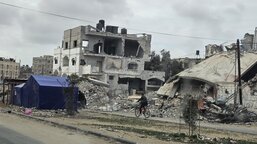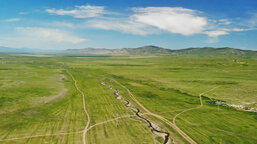The world is currently experiencing a record number of conflicts and crises since the end of World War II. From the war in Gaza, which is hitting civilians particularly hard, to the fighting in Sudan, which has caused a catastrophic humanitarian crisis, to the problems caused by drought and water scarcity in many countries. In 2024, up to 300 million people will need humanitarian aid. What conflicts and crises should we be watching in 2024?
Read the new article: 6 global conflicts and crises to watch in 2025
1. Gaza
Gaza is currently the deadliest place for civilians in the world. Since the escalation of the conflict began last October, over 42,000 people have died in the Gaza Strip and more than 99,000 others have been injured. Over 60% of the casualties are civilians. Some 1.9 million people have been forced to leave their homes, almost the entire population of Gaza.
People do not have access to even basic needs such as drinking water, food or healthcare, and there is a risk of famine in the area. "People are huddled in inhumane conditions in overcrowded alternative accommodation, right on the streets or in makeshift tent camps, where even basic facilities such as shelters or sanitation are not available," explains Lenka Pipkova, Manager of Foreign Communication at Caritas Czech Republic.
Caritas is helping directly in Gaza. Caritas is also calling for an immediate ceasefire. The conflict in Gaza is raising tensions in the Middle East and risks a major regional crisis.
DONATE TO HELP CIVILIANS IN GAZA
2. Sudan
One of the most serious current conflicts in the world is taking place in Sudan. Fighting between the Sudanese army (Sudanese Armed Forces, SAF) and the paramilitary Rapid Support Forces (RSF) caused an enormous humanitarian crisis. Fighting broke out first in the capital Khartoum and quickly spread throughout the country. More than 18 000 people have lost their lives and more than 33 000 others have been injured as a result of the fighting. It is also currently the largest displacement crisis in the world. Up to 12 million people have had to leave their homes, the vast majority - over 10 million people - remain within Sudan. This includes 4,6 million children, making Sudan the country with the highest number of displaced children in the world. The conflict has closed thousands of schools and left 19 million children without education.
24.8 million people are in need of humanitarian assistance, half of the country's nearly 49 million inhabitants. The need for aid has skyrocketed from 15.8 million people at the start of the conflict in April 2023.
Human rights organisations warn of the risk of genocide in the West Darfur region, due to mass killings and forced displacement of the population. Violence from Sudan may spread beyond its borders to neighbouring countries such as Egypt, Libya, Chad, the Central African Republic, Ethiopia, Eritrea and South Sudan, which are already facing an unstable political situation or have themselves experienced violent civil wars.
In Sudan, there has been massive destruction of critical infrastructure, resulting in a complete breakdown of systems, leaving millions of people without enough food and without access to healthcare and other services.
3. Ukraine
Two years passed since the start of the Russian invasion of Ukraine at the end of February. Attacks on civilians and infrastructure have intensified in the country, leaving 14.6 million in Ukraine still in need of humanitarian assistance. A further 3.6 million people remain displaced in safer areas of the country. Caritas Czech Republic is providing decent accommodation in modular houses for the displaced people so that they do not have to stay in overcrowded mass accommodation. Caritas Czech Republic also helped people in Ukraine to prepare for freezing weather. Together with our partner organisation New Dawn, we provided heating for the homes of residents of Kherson and Mykolaiv regions.
Caritas Czech Republic has been helping people affected by the war in Ukraine since the beginning of the invasion. We have repeatedly sent humanitarian aid to the country. We are also helping refugees from Ukraine in Moldova and the Czech Republic.
4. Syria
In March this year, the war in Syria entered its fourteenth year. The situation in the country remains dire, with up to 70 per cent of all Syrians in need of humanitarian aid. The country is suffering from a widespread economic crisis and is facing food shortages due to a long-standing drought. The crisis in Syria was exacerbated by the devastating earthquake last February. This affected areas in the north-west of the country that were already suffering a huge humanitarian crisis before the earthquake as there are internally displaced people who have fled from other parts of the country to escape the fighting. Caritas Czech Republic has provided immediate assistance to the people affected by the earthquake and continues to provide aid that remains desperately needed. The crisis in Syria is further exacerbated by the attacks from Israel on Lebanon which have forced hundreds of thousands of people to flee to Syria.
The situation in Syria is also complicated by uncertainty over cross-border aid deliveries. While humanitarian needs remain high, humanitarian assistance is chronically underfunded and limited. The UN and the Syrian government have agreed to continue cross-border aid deliveries, but the future of this agreement is uncertain and failure to extend it would cut millions off from critically important aid.
In recent years, humanitarian aid has been increasingly combined with development aid in Syria, in partnership with local NGOs. To help Syrian organisations get involved in the reconstruction of their country, Caritas Czech Republic is organising a series of training sessions on how to deliver aid properly and effectively. We are motivating young Syrians to become active in society so that they can participate in the future of their country. This year, we will also provide access to clean water and support women at risk of gender-based violence in Northwest Syria.
5. Democratic Republic of Congo
The Democratic Republic of Congo is facing one of the world's most protracted crises, caused by armed conflict, economic crisis, climate shocks and disease epidemics. In the east of the country, a renewed offensive by the M23 rebel group is increasing the intensity of the conflict and the humanitarian needs. Last year also saw rising political tensions ahead of the presidential elections in December.
Humanitarian needs are estimated at 25.4 million people, the highest of any country globally. Moreover, Congo is among the countries with the highest number of internally displaced people in the world. Refugee camps are overcrowded and their inhabitants are at risk of epidemics of deadly diseases.
The unstable situation and armed conflict in Congo have long led local people to flee to safety across the country's borders. Caritas Czech Republic supports refugees from the Democratic Republic of Congo in Zambia. We have supported both refugee students to study at university and other refugees to open their own businesses and make a living in their new country. Thanks to our support, for example, a tailor's shop or a refrigerator repair workshop was created.
6. Drought and water scarcity
For several years now, the climate crisis has been one of the biggest crises of our time. It is particularly hard on the Middle East and North Africa, but water shortages are affecting many other countries, from Peru to Kenya, Syria, Afghanistan and Somalia.
Climate change is expected to continue to worsen the situation in these areas and lead to massive displacement. Millions of people will move from rapidly drying up areas, due to the impossibility of making a living, to cities in search of jobs that are virtually non-existent.
Water shortages can cause crises even in peaceful countries. Three decades ago, 44 % of all conflicts took place in climate-vulnerable states. Today, the figure is 67 %.
Water scarcity hits children particularly hard. UNICEF reports that one in three children in the world (739 million) live in areas exposed to high or very high water scarcity. It is expected that by 2040, roughly 1 in 4 children worldwide will be living in areas of extremely high water stress. Water scarcity linked to climate change also increases the risk for children in Gaza.
Caritas Czech Republic has long supported smallholder farmers in disadvantaged regions to be able to effectively cope with drought and associated crop failure caused by climate change.
Crisis can escalate also in Yemen, Myanmar or Niger
The list of conflicts and crises above is of course not exhaustive. The situation could escalate in many other places, whether in Yemen, where the economy is on the verge of collapse after nine years of conflict; in Haiti, where violence is increasing as the political crisis deepens; in Myanmar, which has faced a critical deterioration since a military coup in February 2021, exacerbated by renewed clashes between armed groups and the government last year; or in Niger, which saw a coup last July. Violence is also rising rapidly in Burkina Faso or South Sudan, among many other places.
The work of humanitarian organisations such as Caritas Czech Republic remains much needed in helping people affected by the current crises and conflicts around the world.
















